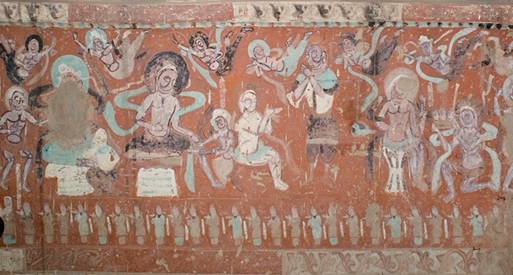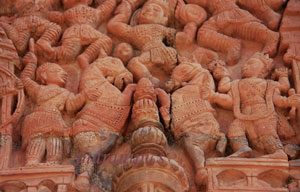
What is karma? Jataka Tales: King Siva offers his body to save a dove from a hawk, and King Candraprabha is so generous that he gives away his own head (Mogao Caves, China, about 500 AD)
What is karma?
Karma is the Sanskrit word for “action” or “doing something.” It comes from an earlier Indo-European word meaning “to make” or “to do”.
Indo-European languages
More about Hinduism
Ancient India articles
Hinduism and karma
This was a central idea in the Indian religion of Hinduism. People thought that whenever you did anything, it affected your future life, and especially your reincarnation. (Compare this to Taoist or Zen Buddhist ideas in China.)
Taoism
Zen Buddhism
How did karma work?

A scene from the Bhagavad Gita: Arjuna fighting Karna, with Krishna as his charioteer (Duttapara Temple, ca. 1500s AD)
According to Hindu ideas, if you did something good for other living creatures, you got good karma. This would help you in the future. For instance, if you helped a friend to understand the assignment, you would pile up some good. That might make sure the teacher asked you only questions to which you knew the answers.
On the other hand, if you did something bad, like killing a spider, you would get bad karma. Maybe when you fell down you would scrape your knee. Americans sometimes say, “What goes around comes around.”
Buddhism and karma
In Hinduism, people saw your karma as something given to you by the gods. The gods decided everything that happened. In Buddhism, though, the gods were left out of it, and the results just happened naturally: good deeds lead to good results, just as apple seeds lead to apple trees.
In fact, the whole idea of karma – that it matters whether you are good or bad – may not go back much before the beginnings of Buddhism, maybe about 500 BC. This may be an idea that came to India from other cultures. It might have come from Chinese Taoists or Buddhists. They were beginning to visit India at this time as the Silk Road got started.
More about Taoism
More about Buddhism
Buddhism in China
What is the Silk Road?
Karma in the Bhagavad Gita
The Bhagavad Gita, probably written sometime around 300 BC, is mostly a long discussion of dharma and karma between Krishna and the prince Arjuna.
What’s the Bhagavad Gita?
What is dharma?
More about Hinduism
Learn by Doing – a project on Hinduism
Bibliography and further reading about Hinduism:





Noice
Thanks!